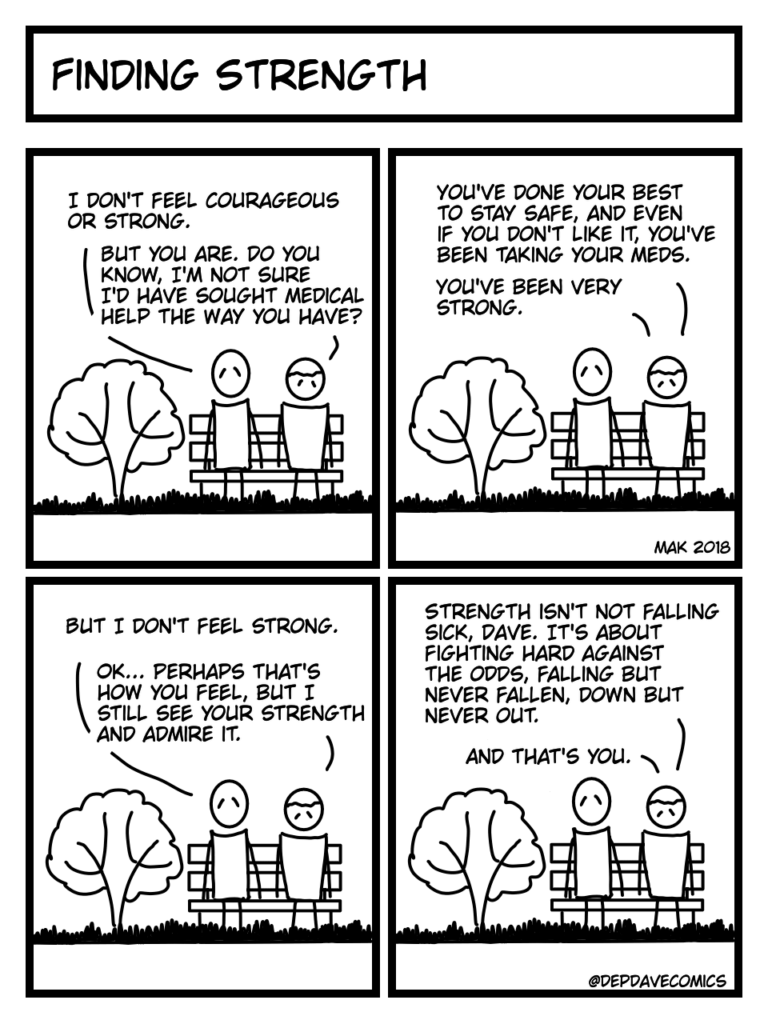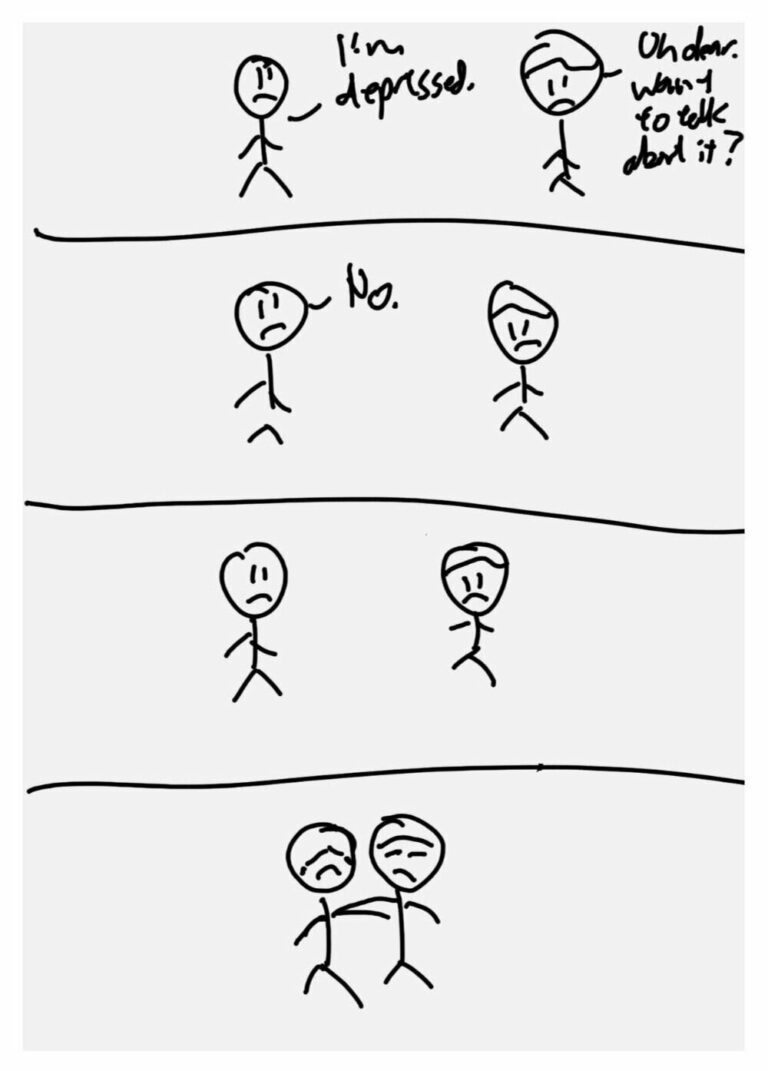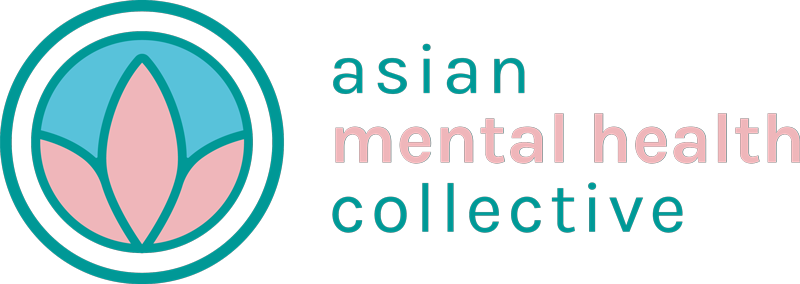By: Kelly Ng
Mak’s journey with depression has been ongoing for several years now. After a stint at Singapore’s Institute of Mental Health in 2017, he decided to document that episode of struggling with depression in a blog. “It is my hope that the blog will help others who either know someone in depression, or is suffering from depression themselves,” he writes on the blog.
While still wrestling with the condition, Mak has invited others on a similar journey to reach out to him. “feel free to contact me, especially if you simply wish to have someone to talk to who knows the pain of depression,” he writes. He also started Depressed Dave, a series of comics inspired by his personal struggles.

Tell us more about yourself and your journey with depression.
A lot of it is documented on my website. In a nutshell, it’s been about three years since I was warded at Singapore’s Institute of Mental Health for depression. I almost took my own life in August 2017. While I am better now, I do still have suicidal thoughts. But it’s better than back then in some ways.
There are some primary issues and trigger points rooted in my experiences from childhood, which have contributed to me having certain expectations of myself. I would say the strongest reason binding me to depression is this inner voice, this critic in me who is always screaming and telling me that I’m not worthy to do certain things. It’s also part of the reason I’m just doing a voice call with you and not video – I am seriously uncomfortable seeing myself.
My recovery, thus far, has been focused on trying to quell this inner critic, to repair the past damage so I can be a husband and father to my family.
What inspired you to come up with Depressed Dave Comics?
I started the comic at the end of 2017. At that time, I was already writing quite a bit about my experiences on the website. But some people like to read, others don’t. And I felt the message of mental health is not only for those who can take long posts and lengthy arguments.
So I started drawing comics on my tablet. It wasn’t straightforward – I couldn’t draw a perfect oval initially and had to find a suitable software to do that. And then someone offered to fund me for it, so I decided to put my own skin into it.
But it really also started as an exercise to make myself feel better, to express myself, and also share with others who might be feeling this way that they are not alone.
As I went along, I realize that the stories and messages I wanted to tell fall into several categories. The first, which I started out with, were facts about medical and psychiatric treatments that were not unique to me, even things like ECT (electroconvulsive therapy).
Later on, I started embedding in my comics messages that I needed to hear myself. One of the story arcs, for instance, is when a grandfather who lost his granddaughter to suicide randomly appears in Dave’s life and tells Dave that suicide is not an option. This was something I wanted to tell myself.
There were also other myths I wanted to debunk – like this idea that men are supposed to be “macho” and mentally/emotionally infallible.
To seek inspiration, I would sometimes go for walks in parks – the Flower Dome is one of those places I frequented. And then if an idea came, I’d just draw and let it flow as it will.

And has the experience of illustrating and telling Dave’s stories been therapeutic?
Actually, not really. Because I have the tendency to think that I will never be good enough for myself, it has become a source of stress for me. I would set certain targets for myself, like tell myself I have to come up with ‘x’ number of comics within certain days… that hasn’t been very helpful.
But while I won’t call it therapeutic, I think drawing these comics give me purpose. There’s still a voice inside telling me that, probably nobody would care. The doubt is strong. But doing this definitely give me purpose.
What has been helpful in your journey thus far?
My wife has been a strong pillar of support. From the time she found out that I was seriously planning to take my own life, she never blamed me, and constantly offered support, but at the same time, she also gives me space.
My family members have also tried their best to understand what I’m going through and give me allowance. My doctors, therapists, friends who listen and don’t judge, even friends I’ve made online through gaming… Several of them are going through similar struggles so they understand this well.
I am a Christian, so religion plays a big part in this as well.
Would you say there’s a stigma surrounding conversations about mental health in Singapore?
I think as Asians, we have a stronger sense of having to follow certain societal values, like we have to respect our elders, don’t talk back to them, don’t tell them what to do… People have a certain sense of expectation of you. And I’ve had people, friends, setting certain expectations of me because I’m a husband and a father.
I have also had people who would suggest I should make certain lifestyle changes. They mean well but they don’t realize the person in front of them is already struggling. This is also why I want the comic to be out there.
There is also this thing called smiling depression, which I think is pretty common among Asians, or Singaporeans – that they work hard to hide their emotional pain.
But I’d say that in the region (Southeast Asia), Singapore is one of the best places in its dealing with mental health. It is probably the only country in the region that has an acute hospital with an A&E department that deals specifically with mental health.
What advice would you give to someone who is trying to walk with a friend who has depression?
There are many things you can do, but I think the most important and also most difficult ones are – Firstly, don’t give advice. Second, listen.
A common response from people who learn that I’m depressed are questions like, “Why are you angry? Why are you sad? There is nothing to be sad about…”
That makes me sad because, why are they saying that there is nothing to be angry about? When we give advice, we assume that the person we are “advising” hasn’t already thought of or tried that piece of advice before. I’d be thinking in my head, “If it were that easy, do you think I would still be here?”
Sometimes when we give advice and make it sound like there is an easy way to get out of the situation, we make the other party feel helpless and guilty.
For many people, listening is also a difficult skill. We should try to be active listeners – we can do that by asking questions to clarify, or rephrasing what we just heard. Hear them out, don’t judge, tell the depressed person who is struggling that you are there for them.
If you know there is someone who is simply willing to listen to you, you feel better as a person. You feel valid.
One of our close friends came over to visit us the other time and brought my favourite drink. And she just sat there with us, she didn’t say much, but I was just so thankful for her being there. I was very touched and grateful. That’s what matters – to have someone who doesn’t talk you out of depression but is just there for you.
About the Author

KELLY NG
Kelly is a multimedia journalist based in Singapore. She’s passionate about crushing myths around mental health through stories and words. For her most recent project, she spent two years in New York working on a documentary about an Asian American kids’ theatre club. You can find more of her stories and writings in her portfolio.

